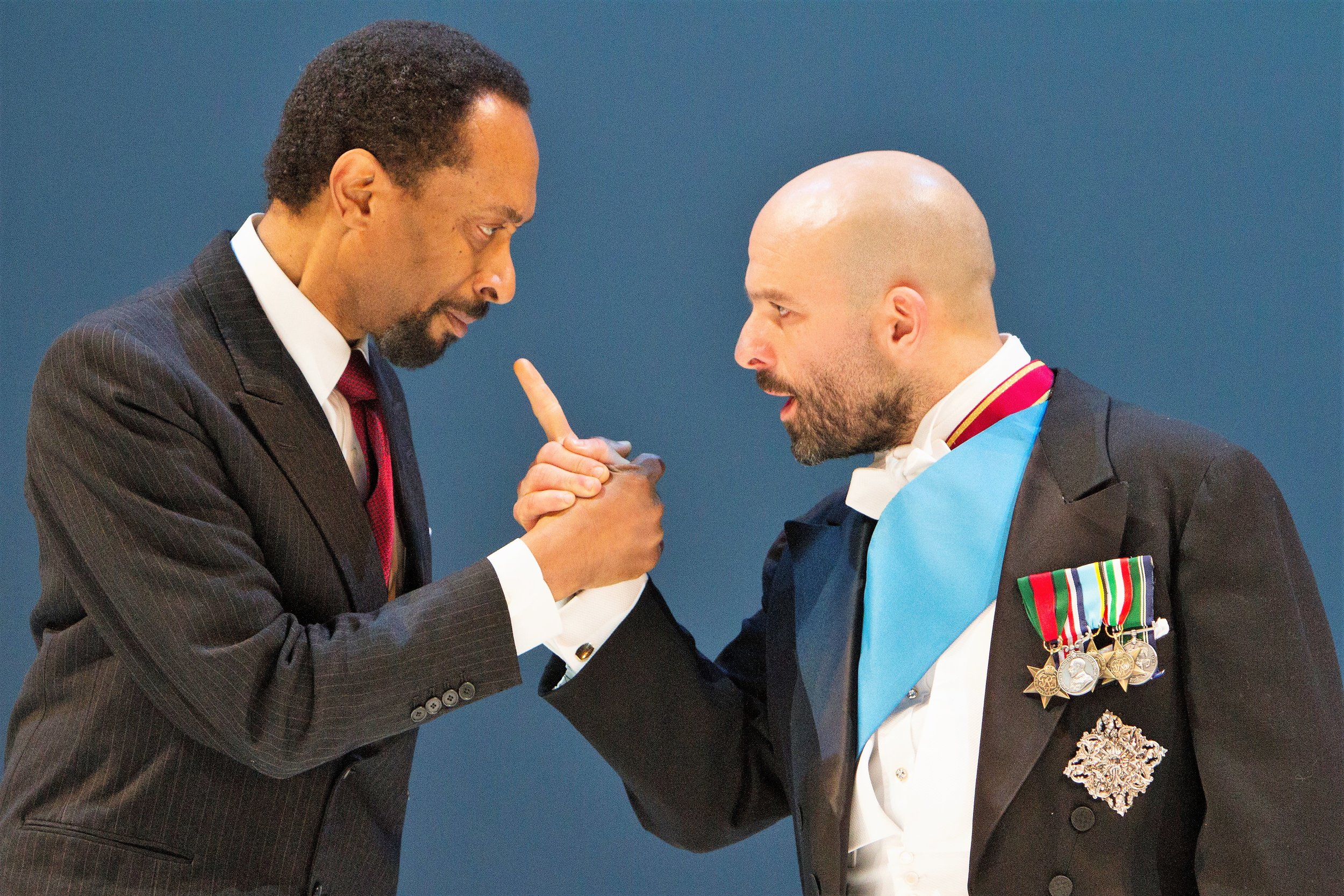It’s a truism that William Shakespeare’s tragicomedy The Winter’s Tale divides into two distinct parts. In the first, Leontes, king of Sicilia, suspects his queen, Hermione, of adultery with his friend Polixenes, king of Bohemia, who has been spending a long sojourn with them but who is leaving for his home country immediately. The biggest hurdle for actors playing Leontes is to make his sudden jealousy credible. “The part is one of the hardest ever written,” Margaret Webster noted in Shakespeare Without Tears: “with almost no preparation, the emotion of it is at flood height.”
Yet in Arin Arbus’s terrific production, Anatol Yusef is completely convincing, masterly in the language and commanding a range of emotions, including anguish, arrogance, and cruelty. He’s a fireplug of a king, short but intense, especially in his speech describing what he sees as proof: “Is whispering nothing? Is leaning cheek to cheek? Is meeting noses?” Of course, an audience’s acceptance of his irrationality may be helped by the example of another paranoid national leader who ignores his counselors and turns on a dime. “I’ll give no blemish to her,” Leontes tells his courtier Camillo, when describing his suspicions about Hermione’s virtue, but he soon reneges.
Michael Rogers (left) is the courtier Camillo and Anatol Yusef is King Leontes in Arin Arbus’s production of William Shakespeare’s The Winter’s Tale. Photo by Henry Grossman. Top, from left: Liz Wisan as Dorcas, Arnie Burton as the pickpocket Autolycus, and Maechi Aharanwa as Mopsa. Photo by Carol Rosegg.
Arbus’s take on the story of cruelty and redemption benefits foremost from crisp, intelligent verse-speaking, from Yusef and Kelley Curran as his wife down to Titus Tompkins, a musician who doubles as a soldier and mariner. The director has modernized bits of the text, cut judiciously, and, most important, paid attention to details. When Mahira Kakkar’s fiery lady-in-waiting Paulina rebukes Leontes for his treatment of her mistress Hermione, she says, “I’ll not call you tyrant,” yet the word causes everyone listening to recoil.
Once Leontes has decided to have his servant Camillo (Michael Rogers) kill Polixenes (Dion Mucciacito), and they flee instead, he becomes more certain that the escape proves what he believes. He has Hermione imprisoned, then dragged before a tribunal to answer charges of adultery; it’s the public condemnation he said he wouldn’t do. The able Yusef gets a laugh from Leontes’ eagerness to hear confirmation from the Delphic oracle, but it’s not what he expected. He has been wrong, and what he has set in motion he cannot undo. The courtier Antigonus has left with his wife’s newborn daughter to dispose of it; his son, Mamillius (Eli Rayman), is killed; and Hermione collapses and dies on hearing of it.
The second half jumps over 16 years, and takes place in Bohemia, where Camillo now serves Polixenes. Here the comedy takes over, as Autolycus, a pickpocket, hoodwinks two dimwitted shepherds, father and son (John Keating and Ed Malone, respectively) and has some improvisational byplay with audience members. Arnie Burton, who has enlivened many a show with his antics, had a sly exuberance as he joshed with a woman named Raquel and her two children. There are songs and a new romance—the abandoned daughter Perdita, who was saved by the shepherds, has attracted the attention of Polixenes’ son Florizel.
Kelley Curran plays the wronged Queen Hermione, and Dion Mucciacito is Polixenes, King of Bohemia. Photo by Carol Rosegg.
In the first part Emily Rebholz costumes Leontes’ court in a totalitarian gray with accents of red, but in Bohemia the rustics are in vibrant, gaudy patterns and colors. There’s more traditional fun as the young shepherd woos two maids, Dorcas and Mopsa, whose jealousy of each other provides comic echoes to Leontes’ murderous jealousy in the first part. Even here, though, royal blood is not free from irrationality. Polixenes learns that Florizel intends to marry Perdita without his consent, and he’s angry; they elope, aided by Camillo, and head for Sicilia, where Leontes has been living a penitent life.
Shakespeare engineers the arrival of the rest of the main characters back in Sicilia, from shepherds to kings, where the comic amours are tied up neatly, while the reconciliation scenes here are as moving as they should be. Leontes discovers that Perdita is his long-lost daughter, and Paulina, through all the years a chaste companion to the humbled ruler, unveils a mysterious statue of Hermione, with magical results.
In the middle of this savvy production Arbus makes one gross misstep. The Winter’s Tale has Shakespeare’s most famous stage direction: Exit, pursued by a bear, as Antigonus (Oberon K.A. Adjepong), leaving the baby Perdita in the wilderness, is chased by the creature. For some reason Arbus has rendered it into slapstick, as Antigonus boxes with the bear, wrestles it, kicks it in the crotch, and runs around the auditorium. The scene is nonsensical and tonally jarring, but it’s easy to overlook in a production that excels in so many other ways. Don’t miss it.
Theater for a New Audience’s The Winter’s Tale plays through April 15 at the Polonsky Shakespeare Center (262 Ashland Place, Brooklyn). Evening performances are at 7:30 p.m. Wednesday through Sunday, except for April 1; matinees are at 2 p.m. Saturday and Sunday. For tickets and information, call (866) 811-4111 or visit tfana.org.





